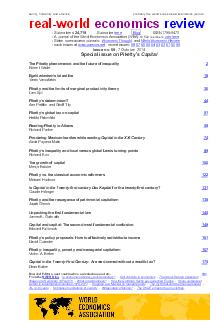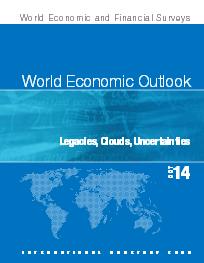Mitchell, B. (2014) “The German ship is sinking under the weight of its own delusions“, Bill Mitchell Blog: Modern Monetary Theory… Macroeconomic Reality Blog, 16 October. Eurostat’s recent publication (October 14, 2014) – Industrial production down by 1.8% in euro area – rightfully sends further alarm bells throughout policy makers in Europe, except I suppose Germany where denial seems to be rising as its industrial production levels fall to …Read More
The mythical Phillips curve?
Wren-Lewis, S. (2014) “The mythical Phillips curve?“, Mainly Macro Blog, 14 Οκτωβρίου. Suppose you had just an hour to teach the basics of macroeconomics, what relationship would you be sure to include? My answer would be the Phillips curve. With the Phillips curve you can go a long way to understanding what monetary policy is all about. My faith in the Phillips curve comes from simple but highly plausible …Read More
The sources of firms’ success
Hottman, C., Redding, S. & Weinstein, E. D. (2014) “The sources of firms’ success“, VoxEU Organisation, 14 October. Recent research highlights that important factors for firm size are costs, quality, markups, and product scope. This column explores the sources that make these factors differ across firms. Quality and in particular, variation in the product scope, is the chief determinant of firm sales. Marginal cost variations do not matter much …Read More
Southern Europe and the Financial Earthquake – Coping with the First Phase of the International Crisis
Verney, S., Bosco, A. & Lobo, M. C. (Eds.) (2014) “Southern Europe and the Financial Earthquake – Coping with the First Phase of the International Crisis“, South European Society and Politics, Routledge Publications, October. Following the outbreak of the international financial crisis, Southern Europe became an epicentre of economic instability and international concern. The prospect of a sovereign debt default in the eurozone’s ‘flaky fringe’ sent shock waves through …Read More
The great mortgaging
Jordà, Ο., Taylor, A. & Schularick, M. (2014) “The great mortgaging“, VoxEU Organisation, 12 October. The Global Crisis prompted Lord Adair Turner to ask if the growth of the financial sector has been socially useful, catalysing an ongoing debate. This column turns to economic history to investigate whether the financial sector is too big. New long-run, disaggregated data on banks’ balance sheets show that mortgage lending by banks has …Read More
Implementing economic reforms – are EU Member States responding to European Semester recommendations?
Deroose, S. & Griesse, J. (2014) “Implementing economic reforms – are EU Member States responding to European Semester recommendations?“, ECFIN Economic Brief, Issue 37, October 2014. Summary: For the past four years, the EU has issued country-specific recommendations for economic reform to its Member States under the European Semester. A synthetic indicator of EU-wide implementation of these recommendations shows a score of just over 40%. While this is higher …Read More
International Debt and Financial Crises
Joyce, P. J. (2014) “International Debt and Financial Crises“, Economonitor, 09 Οκτωβρίου. The latest issue of the IMF’s World Economic Outlook has a chapter on global imbalances that discusses the evolution of net foreign assets (also known as the net international investment position) in debtor and creditor nations. The authors warn that increases in the foreign holdings of domestic liabilities can raise the probability of different types of financial crises, including banking, currency, …Read More
Real-World Economics Review, Special issue on Piketty’s Capital
World Economics Association (WEA) Real-World Economics Review, Issue no. 69, 07 October 2014 Special Issue on Piketty’s Capital. Economists and other social scientists tend to study “problems”. Issues not studied tend to be seen as “natural”. “Poverty” and the “poor” are problems, the subject of a vast social science literature. Inequality, income concentration, the behaviour and influence of the super-rich tend to be treated as part of the natural …Read More
Monthly CFM Survey: Secular Stagnation
Monthly CFM Survey: Secular Stagnation, Centre for Macroeconomic Survey, 03 October 2014. This month’s questions concern the revival of interest in the idea of secular stagnation. The survey was conducted in the last week of September. A full list of written responses from our panel of experts can be found here. Only 24% (27% if we weigh by confidence) of respondents think that the Western economies have entered a …Read More
World Economic Outlook, October 2014: Legacies-Clouds-Uncertainties
IMF (2014) “World Economic Outlook, October 2014: Legacies-Clouds-Uncertainties“, World Economic and Financial Surveys, International Monetary Fund. Abstract The pace of recovery has disappointed in recent years, and downside risks have increased, including from heightened geopolitical tensions. These increased risks make it a priority to raise actual and potential growth. In a number of economies, an increase in public infrastructure investment can also provide support to demand and help boost …Read More








